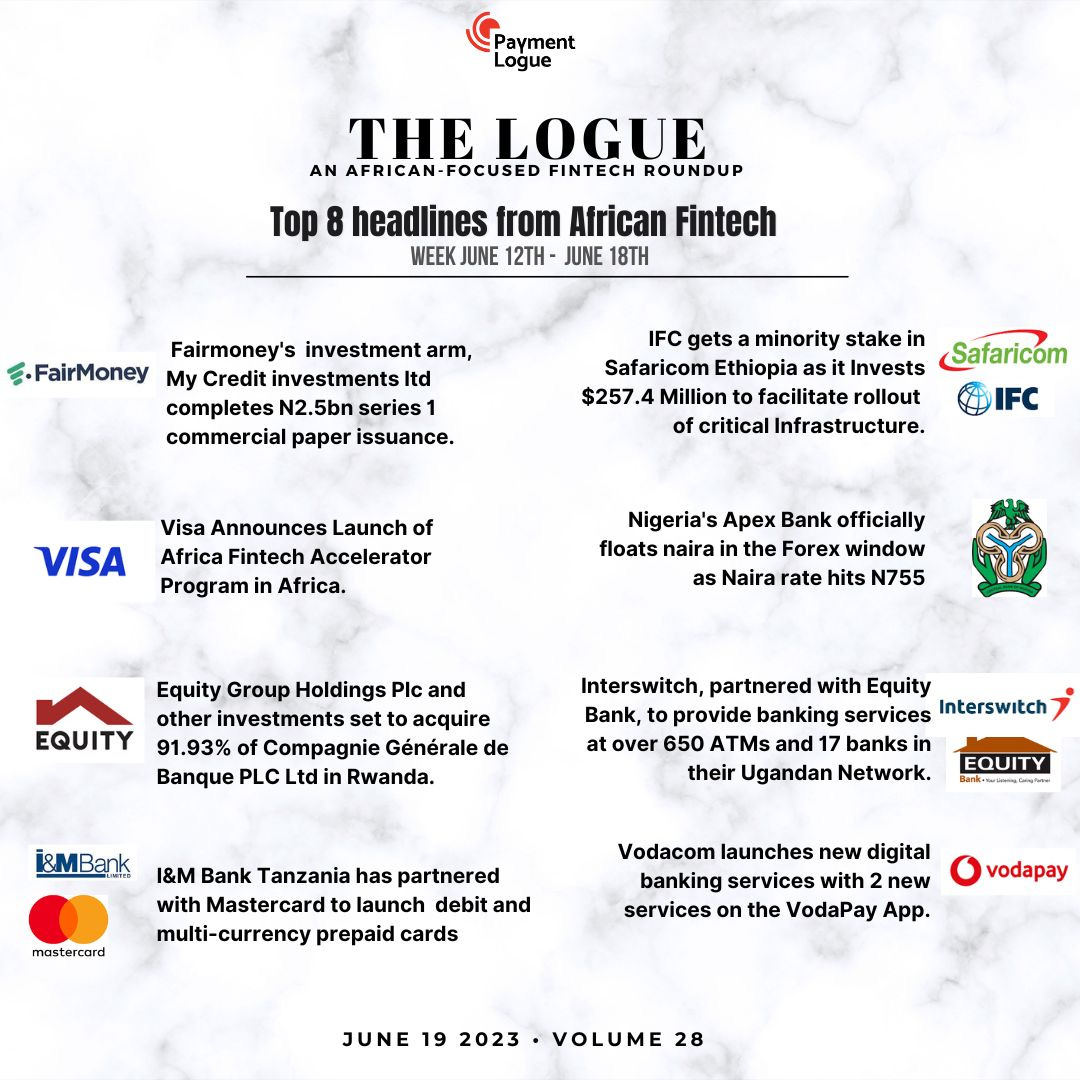Keeping up with the Naija-shians 📺- Naira Floats, Crypto Tax et al.
Plus a deep dive on funding by Commercial Paper Issuance | Vol 28 | June 19th, 2023
Hello Fintech Friends,
Phew! almost didn’t make it but we are here and back with another African Spicy Tuesday update! 🌶️.
Before we jump in, last Sunday was Father’s Day, so let’s give it up for all the Daddies and Fathers in the house! We celebrate you - May your accounts never run dry. Happy Father’s Day.
What do we have in this week’s dose of African Fintech 💊?
📌Keeping up with the changes happening in the Nigerian Financial Space📖
📌Funding has resumed, but a queer kind - Let’s discuss Commercial Papers💰
📌 A Fintech can have 99 problems, but Fintech Ops shouldn’t be 1 of them.😸
📌 As usual, The Weekly roundup in a shareable infographic.
🙃Naija-Shians or is it Shenanigans?
The new Nigerian government promised they will hit the ground running🏃🏽♀️ and boy! have they had us trying to keep up the pace. If you work for a Fintech, have invested in a Fintech or you operate one in Nigeria - the past few weeks have been🌀😩.
Let’s take a look at some of the new changes that have happened affecting Fintech in the past few weeks.
Fuel Subsidy removal: This one affected everyone, especially logistics which affected payments and all. I know a few payments I didn’t make cos the delivery fees didn’t make any sense.
Suspending and Investigating the Former CBN Governor: We reported last week that the CBN governor had been suspended. So how does that affect Fintech?
The 1st is the dis-ease in the whole ecosystem, it’s been a long while since anyone moved up on the Fintech Biggest Regulator seat like that.
👉🏽Secondly, what happens to all the policies in progress: New naira! Cash limits!!, E-naira!!! , AfriGo !!!!
Floating the naira: This is the biggest one, as it has sent a lot of Fintechs focused on cross-border transactions to the strategy room. Previously customers will have to buy dollars at the black market rate to fund virtual cards in order to make international payments. The Fintechs obviously made some money on that funding. With the arbitrage removed( though this is still virtual reality), it seems naira cards will soon work and all that expensive USD card funding will go away.
Wow…
We now possibly have a 10% Crypto Tax: Going down memory lane, Crypto transactions were banned 1st, then a National blockchain policy was instituted. Lately, the Nigerian Finance Act 2023 was updated. Specifically, a Capital Gains Tax Act was introduced which attracted a 10% tax on Digital Assets. Guess what falls under digital assets? Crypto, Tokens NFTS.. yup!
This is a developing story, there are even some unconfirmed reports that the government is planning to ‘regulate‘ the floating of the naira. Fingers crossed, we are watching this space keenly. 👀
Ok, so why Shenanigans? , well some people think the government is accelerating all this activity ( with a partial cabinet by the way) to instil confidence in the public amidst an ongoing court case on the elections. Thoughts?
⛓️About Fairmoney’s N2.5bn Commercial paper issuance
We are used to funding raising from Grants, Angel investments, Bootstrapping, and Equity investments. We are even getting used to Debt Funding as a capital injection option.
Last week the high-growth Nigerian digital bank, My Credit investments ltd (Fairmoney Nigeria) completed an N2.5bn series 1 commercial paper issuance.🥂
So you might have a few questions like
Wait ! so who is MyCredit Investments Ltd?
What is a Commercial Paper issuance?
Why did Fairmoney need to raise one?
We will answer ALL! in this newsletter in very simple sentences, read on…
Who is MyCredit Investments Ltd?
MyCredit Investments Limited is a private limited liability company incorporated in Nigeria as the formal, registered name of Fairmoney in Nigeria. So that is the connection. Other facts about Fairmoney include:
They were incorporated in 2017 and started operations in 2018. They also got their MFB license in 2021.
Their parent company is Predictus SAS in France, they also have a sister company in India.
Facts about Commercial Papers.
So what are Commercial papers? Commercial papers unsecured, short-term promissory notes with a maturity period of under a year, generally not exceeding 270 days. They are issued by credit-worthy companies to meet their short-term obligations.
Who can issue one? Usually, only public companies are allowed to issue one, but in Nigeria, a private company can issue commercial papers on the FMDQ platform. When it is issued on this platform it is not subject to the SEC rules. See the FMDQ link for the Fairmoney transaction here.
A quick look at Credit Ratings
Remember we said that CPs are unsecured, so it is important to have an independent body , that can quantify the risk based on company health and operating environment. 2 credit rating bodies gave Fairmoney a rating, see more info below:
DataPro, a Nigerian-based credit rating agency, gave MyCredit Investments Limited, a long-term rating of “BBB+” which indicates slight risk. They added that they forecast a stable outlook for the year 2021/2022. ( 2023 nko ?🙄 )
GCR, an SA-Based rating Agency has affirmed MyCredit Investments Limited’s (trading as ‘FairMoney’) Nigerian national scale long-term and short-term issuer ratings of BBB(NG) and A3(NG) respectively, the outlook was revised to Negative from Stable.
Why did Fairmoney need to raise a Commercial Paper?
In a public statement by their Managing Director, they plan to use the CP Issuance to support the Company’s short-term liquidity needs and finance the growth in its loan book. There are levels to this Fintech Funding thing.. nice!
💱 How to reduce your Fintech Ops Headache
Fintech Operations is not Banking Operations. Let me explain.
It's like a dual carriage highway, with one lane focused on access to efficient Fintech services for customers, and the other land focused on the existing Payment rails.
The thing is these lanes meet at some point, and that is where the loop breaks.
That is when a high-growth new Fintech gets overwhelmed with customer concerns daily because your product hasn't factored the value chain IN YOUR MARKET for transfers, purchases, recurring payments, or chargebacks.
These are the issues:
Assuming that partnering with Banks will solve everything, but Partners won't sort out your customer success, Operations, and internal settlement. They have theirs to deal with.
Your Operations isn't 1 size, it needs to cater to various channels & Payment methods and customer types you are adding to your initial product (MVP).
You need to understand how to integrate with Banks and processors to optimize for service delivery, recovery, settlement, and reconciliation.
In our upcoming Seamless Fintech Ops course, we address these over 4 weekends - this is what you'll achieve. 👇🏼
We break down how to design operations for various Payment products: Account product Ops differ from Card product Ops.
Best practices for effective Operations when your platform supports multiple partners and payment methods.
You'll understand the flow of money, the settlement stakeholders, and the systems involved.
We show you how to set up a chart of accounts, settlements, and integration types with parameters you should consider to ease Recon and Disputes.
To learn more and register, click here: https://lnkd.in/gtbZ7XqD
The Weekly Roundup
Finally, on today’s dashboard, we’ve selected the top 8 headlines that made the most impact, take a look 👇🏽.
And that is all for this week’s newsletter. If you found this informative, please subscribe, comment, and share in your Fintech circle. Have an awesome week!









